PICOT Analysis & Literature Review: Cognitive Therapy for Depression
VerifiedAdded on 2023/06/04
|14
|3161
|193
Literature Review
AI Summary
This literature review addresses the use of cognitive therapy for managing depression in older adults, particularly in care home settings, using the PICOT framework to formulate a clinical question. The review includes an analysis of quantitative and qualitative research articles retrieved from databases such as CINAHL, Medline, and Google Scholar, focusing on studies published between 2013 and 2018. The quantitative studies explore the efficacy of internet-based cognitive-behavioral interventions compared to face-to-face therapy, the impact of emotion regulation skills training on cognitive behavioral therapy outcomes, and the effectiveness of cognitive-behavioral therapy for chronic pain. The qualitative studies include meta-analyses examining the effectiveness of cognitive-behavioral therapy for adult depression and the mechanisms through which mindfulness-based cognitive therapy and stress reduction improve mental health and wellbeing. Each article's abstract is provided along with a description of the data collection methods used, contributing to a comprehensive overview of the current evidence base for cognitive therapy in treating depression among older adults.
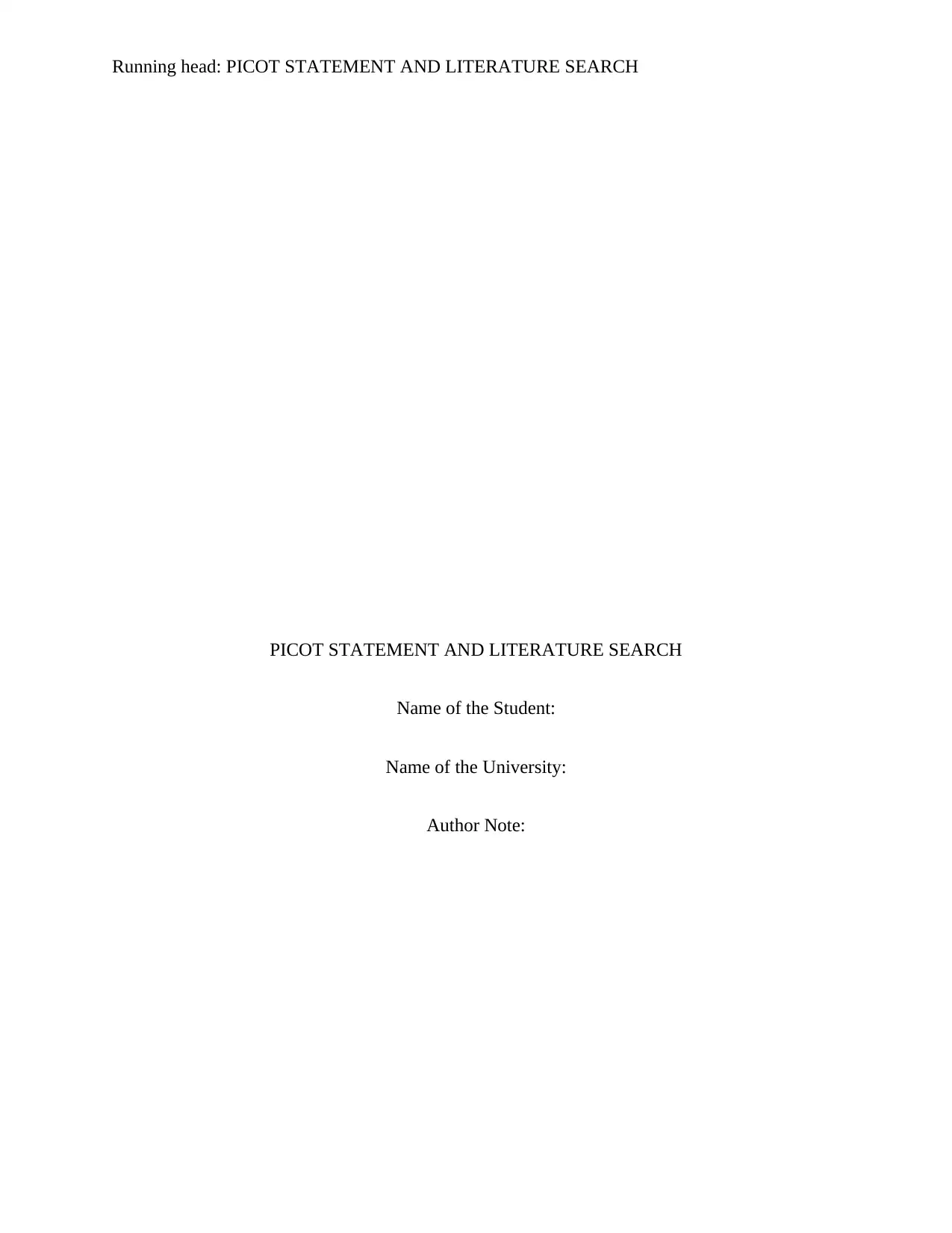
Running head: PICOT STATEMENT AND LITERATURE SEARCH
PICOT STATEMENT AND LITERATURE SEARCH
Name of the Student:
Name of the University:
Author Note:
PICOT STATEMENT AND LITERATURE SEARCH
Name of the Student:
Name of the University:
Author Note:
Paraphrase This Document
Need a fresh take? Get an instant paraphrase of this document with our AI Paraphraser
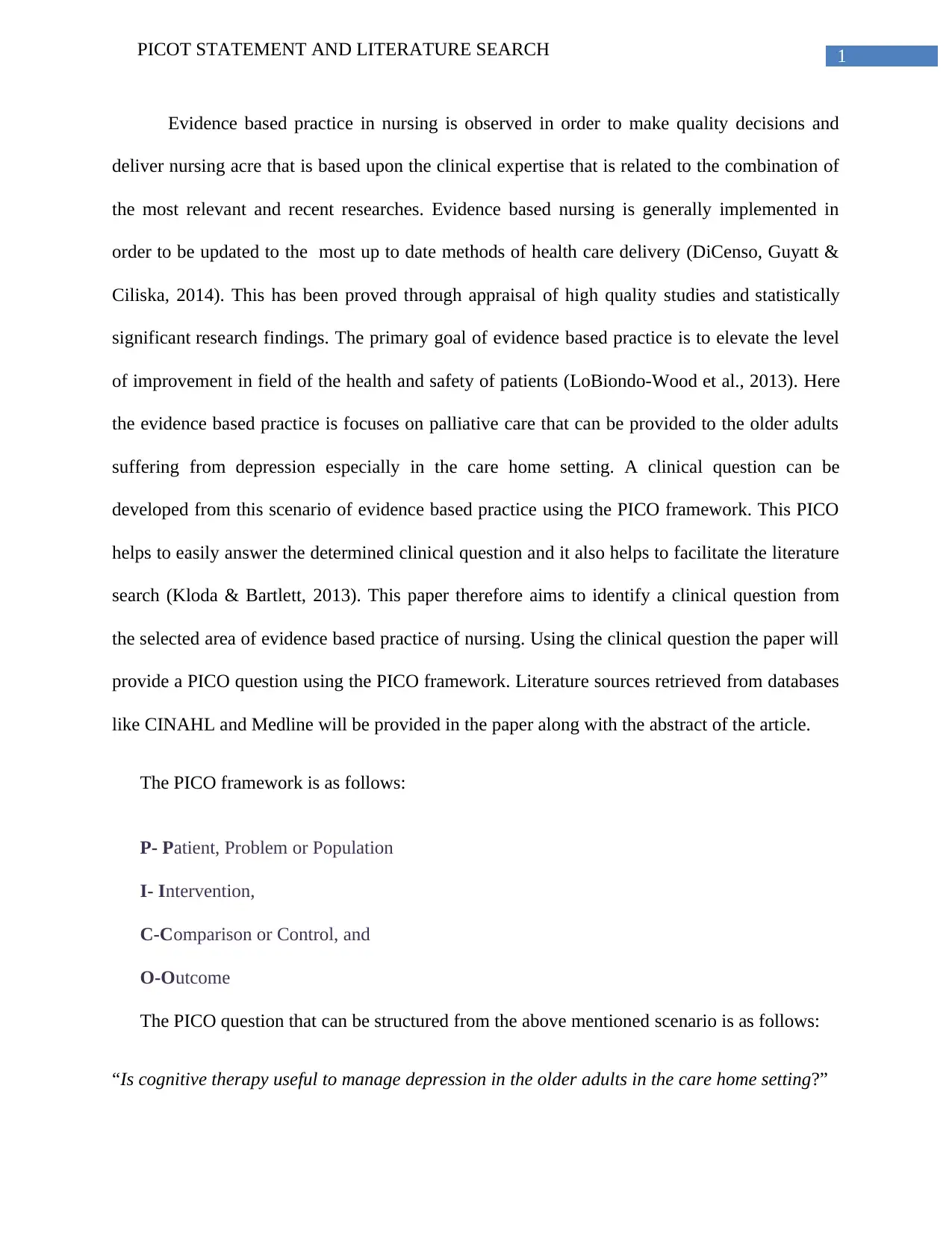
1PICOT STATEMENT AND LITERATURE SEARCH
Evidence based practice in nursing is observed in order to make quality decisions and
deliver nursing acre that is based upon the clinical expertise that is related to the combination of
the most relevant and recent researches. Evidence based nursing is generally implemented in
order to be updated to the most up to date methods of health care delivery (DiCenso, Guyatt &
Ciliska, 2014). This has been proved through appraisal of high quality studies and statistically
significant research findings. The primary goal of evidence based practice is to elevate the level
of improvement in field of the health and safety of patients (LoBiondo-Wood et al., 2013). Here
the evidence based practice is focuses on palliative care that can be provided to the older adults
suffering from depression especially in the care home setting. A clinical question can be
developed from this scenario of evidence based practice using the PICO framework. This PICO
helps to easily answer the determined clinical question and it also helps to facilitate the literature
search (Kloda & Bartlett, 2013). This paper therefore aims to identify a clinical question from
the selected area of evidence based practice of nursing. Using the clinical question the paper will
provide a PICO question using the PICO framework. Literature sources retrieved from databases
like CINAHL and Medline will be provided in the paper along with the abstract of the article.
The PICO framework is as follows:
P- Patient, Problem or Population
I- Intervention,
C-Comparison or Control, and
O-Outcome
The PICO question that can be structured from the above mentioned scenario is as follows:
“Is cognitive therapy useful to manage depression in the older adults in the care home setting?”
Evidence based practice in nursing is observed in order to make quality decisions and
deliver nursing acre that is based upon the clinical expertise that is related to the combination of
the most relevant and recent researches. Evidence based nursing is generally implemented in
order to be updated to the most up to date methods of health care delivery (DiCenso, Guyatt &
Ciliska, 2014). This has been proved through appraisal of high quality studies and statistically
significant research findings. The primary goal of evidence based practice is to elevate the level
of improvement in field of the health and safety of patients (LoBiondo-Wood et al., 2013). Here
the evidence based practice is focuses on palliative care that can be provided to the older adults
suffering from depression especially in the care home setting. A clinical question can be
developed from this scenario of evidence based practice using the PICO framework. This PICO
helps to easily answer the determined clinical question and it also helps to facilitate the literature
search (Kloda & Bartlett, 2013). This paper therefore aims to identify a clinical question from
the selected area of evidence based practice of nursing. Using the clinical question the paper will
provide a PICO question using the PICO framework. Literature sources retrieved from databases
like CINAHL and Medline will be provided in the paper along with the abstract of the article.
The PICO framework is as follows:
P- Patient, Problem or Population
I- Intervention,
C-Comparison or Control, and
O-Outcome
The PICO question that can be structured from the above mentioned scenario is as follows:
“Is cognitive therapy useful to manage depression in the older adults in the care home setting?”
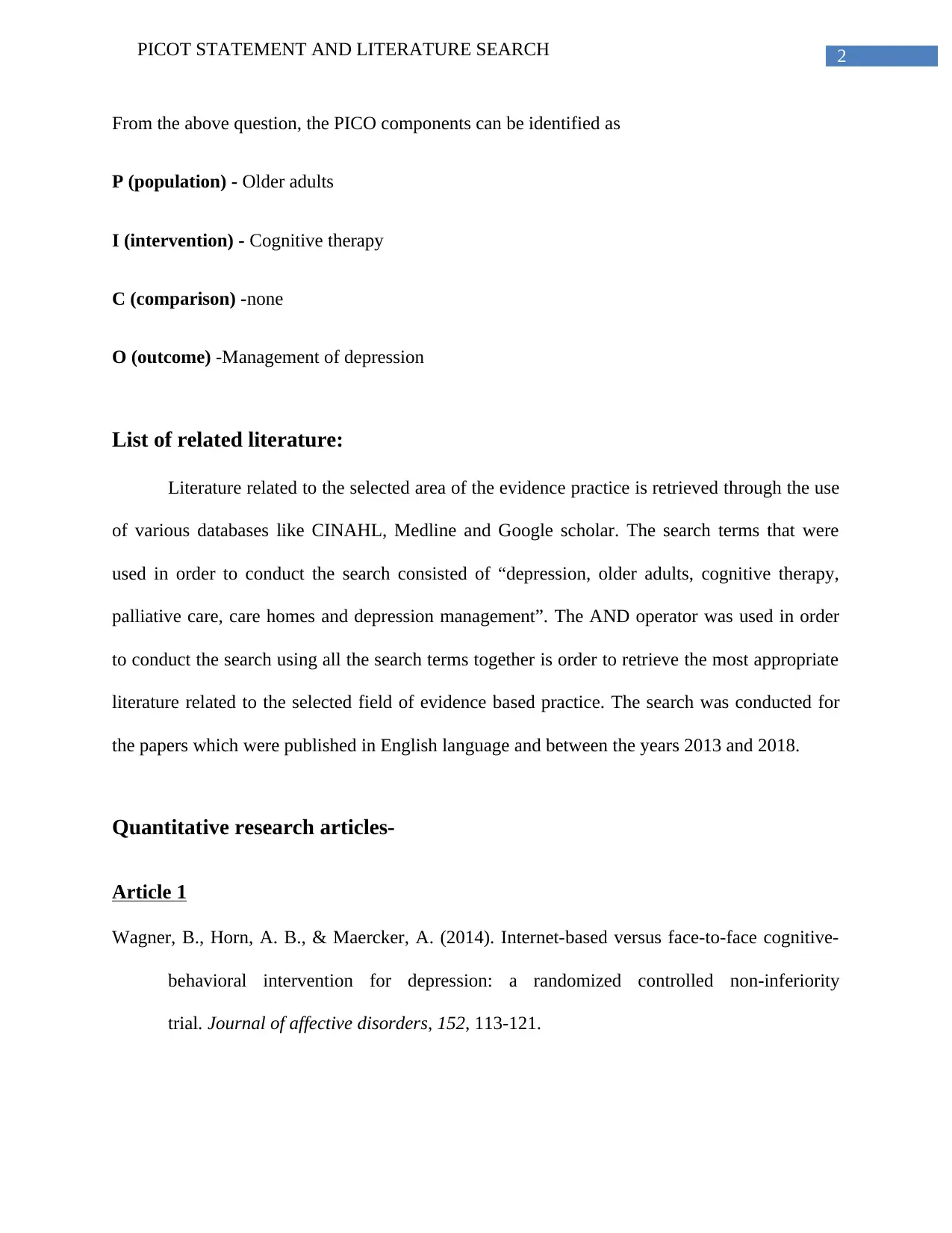
2PICOT STATEMENT AND LITERATURE SEARCH
From the above question, the PICO components can be identified as
P (population) - Older adults
I (intervention) - Cognitive therapy
C (comparison) -none
O (outcome) -Management of depression
List of related literature:
Literature related to the selected area of the evidence practice is retrieved through the use
of various databases like CINAHL, Medline and Google scholar. The search terms that were
used in order to conduct the search consisted of “depression, older adults, cognitive therapy,
palliative care, care homes and depression management”. The AND operator was used in order
to conduct the search using all the search terms together is order to retrieve the most appropriate
literature related to the selected field of evidence based practice. The search was conducted for
the papers which were published in English language and between the years 2013 and 2018.
Quantitative research articles-
Article 1
Wagner, B., Horn, A. B., & Maercker, A. (2014). Internet-based versus face-to-face cognitive-
behavioral intervention for depression: a randomized controlled non-inferiority
trial. Journal of affective disorders, 152, 113-121.
From the above question, the PICO components can be identified as
P (population) - Older adults
I (intervention) - Cognitive therapy
C (comparison) -none
O (outcome) -Management of depression
List of related literature:
Literature related to the selected area of the evidence practice is retrieved through the use
of various databases like CINAHL, Medline and Google scholar. The search terms that were
used in order to conduct the search consisted of “depression, older adults, cognitive therapy,
palliative care, care homes and depression management”. The AND operator was used in order
to conduct the search using all the search terms together is order to retrieve the most appropriate
literature related to the selected field of evidence based practice. The search was conducted for
the papers which were published in English language and between the years 2013 and 2018.
Quantitative research articles-
Article 1
Wagner, B., Horn, A. B., & Maercker, A. (2014). Internet-based versus face-to-face cognitive-
behavioral intervention for depression: a randomized controlled non-inferiority
trial. Journal of affective disorders, 152, 113-121.
⊘ This is a preview!⊘
Do you want full access?
Subscribe today to unlock all pages.

Trusted by 1+ million students worldwide
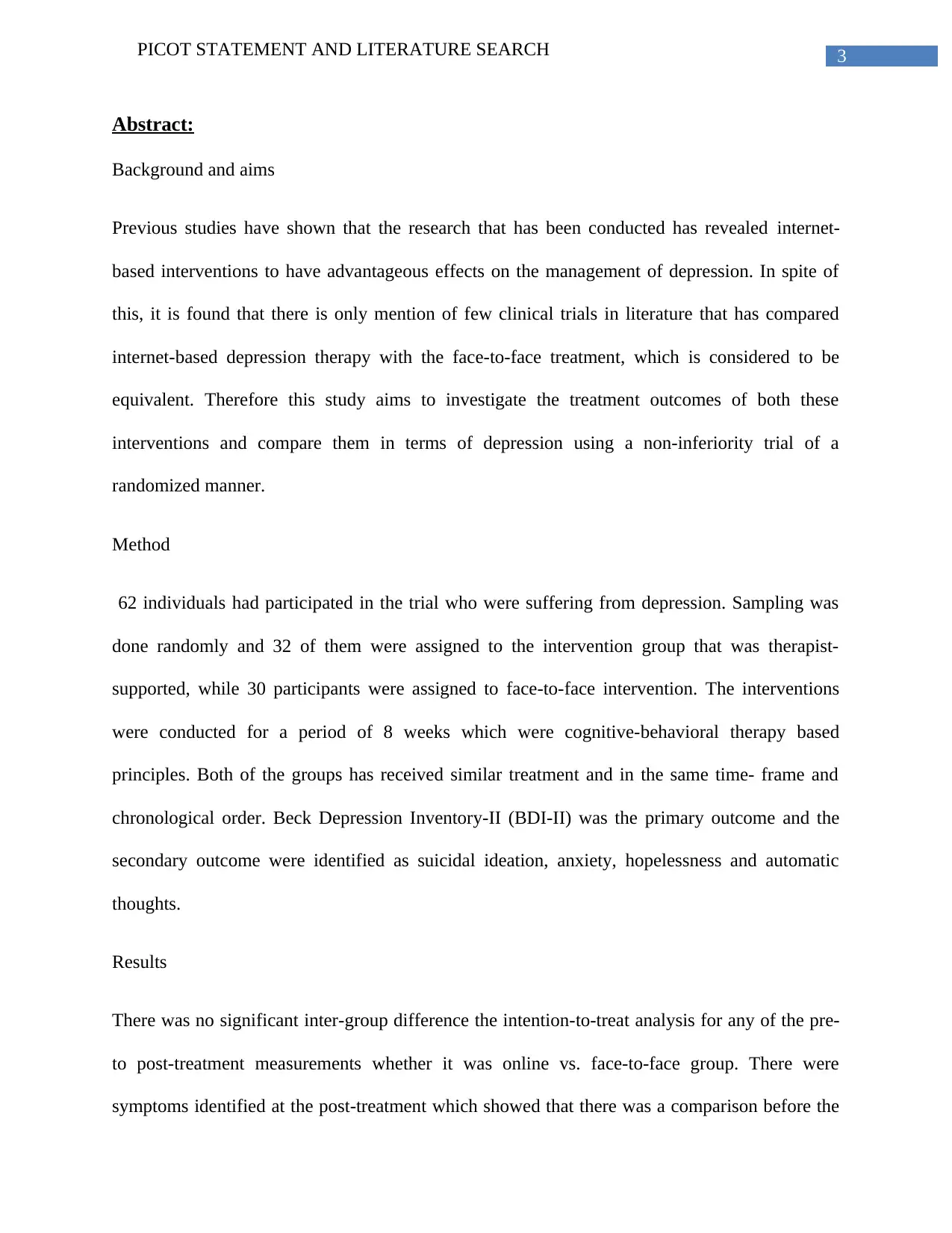
3PICOT STATEMENT AND LITERATURE SEARCH
Abstract:
Background and aims
Previous studies have shown that the research that has been conducted has revealed internet-
based interventions to have advantageous effects on the management of depression. In spite of
this, it is found that there is only mention of few clinical trials in literature that has compared
internet-based depression therapy with the face-to-face treatment, which is considered to be
equivalent. Therefore this study aims to investigate the treatment outcomes of both these
interventions and compare them in terms of depression using a non-inferiority trial of a
randomized manner.
Method
62 individuals had participated in the trial who were suffering from depression. Sampling was
done randomly and 32 of them were assigned to the intervention group that was therapist-
supported, while 30 participants were assigned to face-to-face intervention. The interventions
were conducted for a period of 8 weeks which were cognitive-behavioral therapy based
principles. Both of the groups has received similar treatment and in the same time- frame and
chronological order. Beck Depression Inventory-II (BDI-II) was the primary outcome and the
secondary outcome were identified as suicidal ideation, anxiety, hopelessness and automatic
thoughts.
Results
There was no significant inter-group difference the intention-to-treat analysis for any of the pre-
to post-treatment measurements whether it was online vs. face-to-face group. There were
symptoms identified at the post-treatment which showed that there was a comparison before the
Abstract:
Background and aims
Previous studies have shown that the research that has been conducted has revealed internet-
based interventions to have advantageous effects on the management of depression. In spite of
this, it is found that there is only mention of few clinical trials in literature that has compared
internet-based depression therapy with the face-to-face treatment, which is considered to be
equivalent. Therefore this study aims to investigate the treatment outcomes of both these
interventions and compare them in terms of depression using a non-inferiority trial of a
randomized manner.
Method
62 individuals had participated in the trial who were suffering from depression. Sampling was
done randomly and 32 of them were assigned to the intervention group that was therapist-
supported, while 30 participants were assigned to face-to-face intervention. The interventions
were conducted for a period of 8 weeks which were cognitive-behavioral therapy based
principles. Both of the groups has received similar treatment and in the same time- frame and
chronological order. Beck Depression Inventory-II (BDI-II) was the primary outcome and the
secondary outcome were identified as suicidal ideation, anxiety, hopelessness and automatic
thoughts.
Results
There was no significant inter-group difference the intention-to-treat analysis for any of the pre-
to post-treatment measurements whether it was online vs. face-to-face group. There were
symptoms identified at the post-treatment which showed that there was a comparison before the
Paraphrase This Document
Need a fresh take? Get an instant paraphrase of this document with our AI Paraphraser
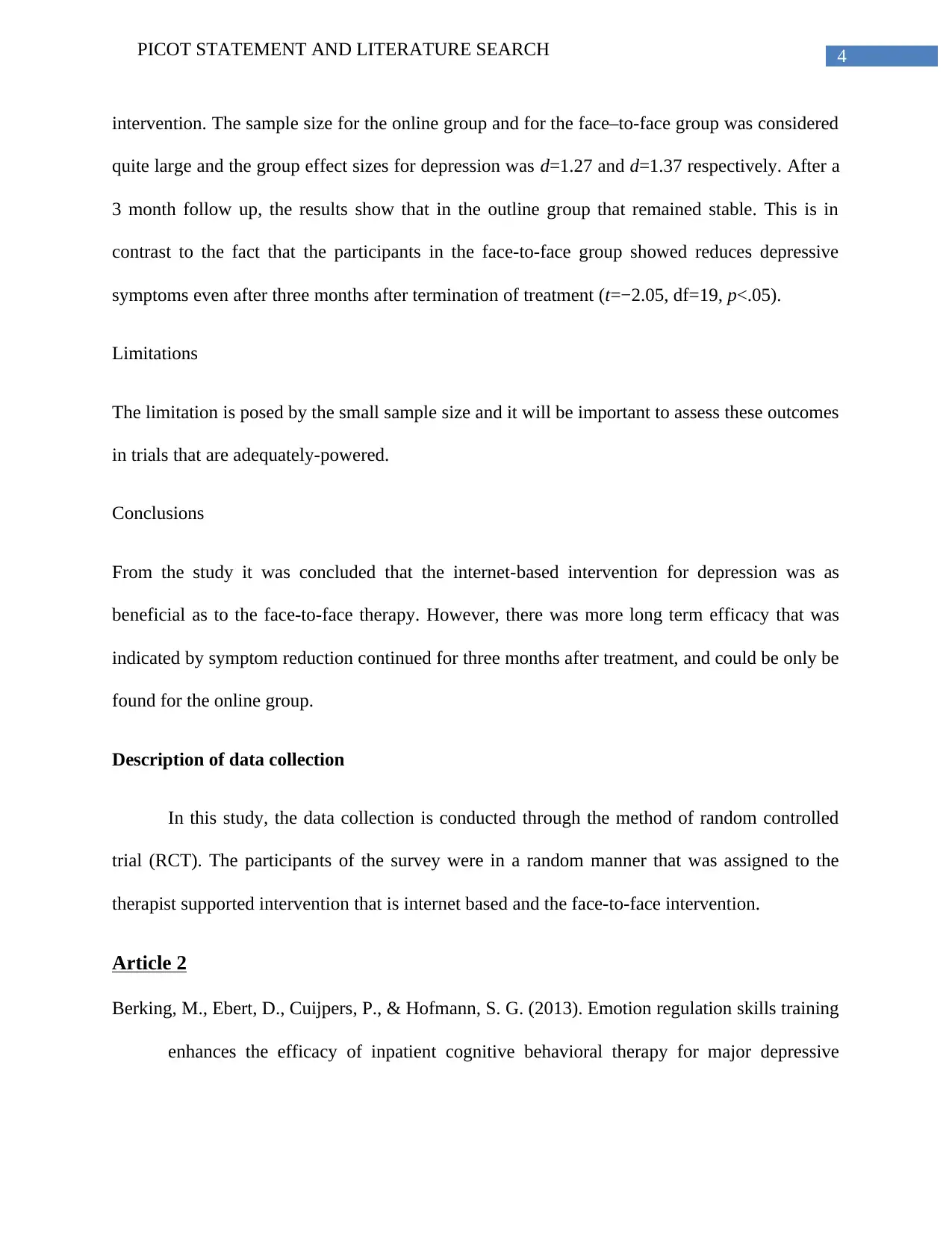
4PICOT STATEMENT AND LITERATURE SEARCH
intervention. The sample size for the online group and for the face–to-face group was considered
quite large and the group effect sizes for depression was d=1.27 and d=1.37 respectively. After a
3 month follow up, the results show that in the outline group that remained stable. This is in
contrast to the fact that the participants in the face-to-face group showed reduces depressive
symptoms even after three months after termination of treatment (t=−2.05, df=19, p<.05).
Limitations
The limitation is posed by the small sample size and it will be important to assess these outcomes
in trials that are adequately-powered.
Conclusions
From the study it was concluded that the internet-based intervention for depression was as
beneficial as to the face-to-face therapy. However, there was more long term efficacy that was
indicated by symptom reduction continued for three months after treatment, and could be only be
found for the online group.
Description of data collection
In this study, the data collection is conducted through the method of random controlled
trial (RCT). The participants of the survey were in a random manner that was assigned to the
therapist supported intervention that is internet based and the face-to-face intervention.
Article 2
Berking, M., Ebert, D., Cuijpers, P., & Hofmann, S. G. (2013). Emotion regulation skills training
enhances the efficacy of inpatient cognitive behavioral therapy for major depressive
intervention. The sample size for the online group and for the face–to-face group was considered
quite large and the group effect sizes for depression was d=1.27 and d=1.37 respectively. After a
3 month follow up, the results show that in the outline group that remained stable. This is in
contrast to the fact that the participants in the face-to-face group showed reduces depressive
symptoms even after three months after termination of treatment (t=−2.05, df=19, p<.05).
Limitations
The limitation is posed by the small sample size and it will be important to assess these outcomes
in trials that are adequately-powered.
Conclusions
From the study it was concluded that the internet-based intervention for depression was as
beneficial as to the face-to-face therapy. However, there was more long term efficacy that was
indicated by symptom reduction continued for three months after treatment, and could be only be
found for the online group.
Description of data collection
In this study, the data collection is conducted through the method of random controlled
trial (RCT). The participants of the survey were in a random manner that was assigned to the
therapist supported intervention that is internet based and the face-to-face intervention.
Article 2
Berking, M., Ebert, D., Cuijpers, P., & Hofmann, S. G. (2013). Emotion regulation skills training
enhances the efficacy of inpatient cognitive behavioral therapy for major depressive

5PICOT STATEMENT AND LITERATURE SEARCH
disorder: a randomized controlled trial. Psychotherapy and Psychosomatics, 82(4), 234-
245.
Abstract:
The background of the study shows that regulation of the emotional skills are the probable
factors that maintain the major depressive disorder (MDD). The study aimed to determine
whether integration of the systematic emotion regulation training (ERT) played a role in
enhancing the efficiency of the routine inpatient cognitive behavioral therapy (CBT) for MDD.
The method implemented was the prospective randomized controlled trial method that involved
participation of 432 inpatients, who met the criteria for MDD and were assigned to receive either
routine CBT or CBT enriched with an intense emotion regulation skills training (CBT-ERT).
The results of the study showed that participants in the CBT-ERT condition were associated with
decreased depression levels where the response rate was revealed as CBT: 75.5%, CBT-ERT:
84.9%; remission rates - CBT: 51.1%, CBT-ERT: 65.1%. Additionally the participants of the
CBT-ERT showed a higher amount of reduction in adverse effects where with the higher
increase in the well-being along with the emotion regulation skill, it was particularly relevant for
mental health.
In conclusion it was deduced that integration of the strategies that target emotion regulation skills
helped in improving the efficacy of CBT for MDD.
Description of data collection
disorder: a randomized controlled trial. Psychotherapy and Psychosomatics, 82(4), 234-
245.
Abstract:
The background of the study shows that regulation of the emotional skills are the probable
factors that maintain the major depressive disorder (MDD). The study aimed to determine
whether integration of the systematic emotion regulation training (ERT) played a role in
enhancing the efficiency of the routine inpatient cognitive behavioral therapy (CBT) for MDD.
The method implemented was the prospective randomized controlled trial method that involved
participation of 432 inpatients, who met the criteria for MDD and were assigned to receive either
routine CBT or CBT enriched with an intense emotion regulation skills training (CBT-ERT).
The results of the study showed that participants in the CBT-ERT condition were associated with
decreased depression levels where the response rate was revealed as CBT: 75.5%, CBT-ERT:
84.9%; remission rates - CBT: 51.1%, CBT-ERT: 65.1%. Additionally the participants of the
CBT-ERT showed a higher amount of reduction in adverse effects where with the higher
increase in the well-being along with the emotion regulation skill, it was particularly relevant for
mental health.
In conclusion it was deduced that integration of the strategies that target emotion regulation skills
helped in improving the efficacy of CBT for MDD.
Description of data collection
⊘ This is a preview!⊘
Do you want full access?
Subscribe today to unlock all pages.

Trusted by 1+ million students worldwide
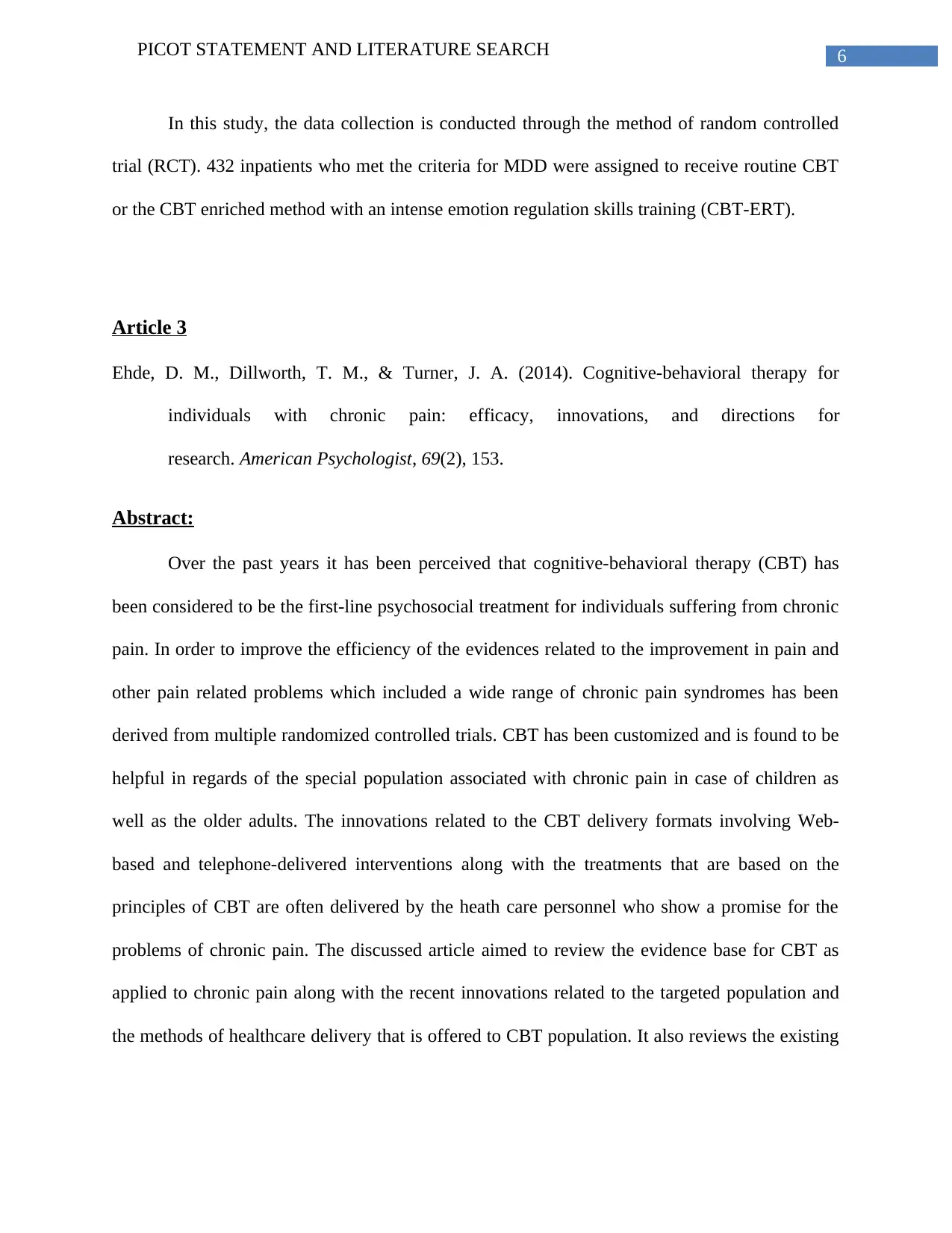
6PICOT STATEMENT AND LITERATURE SEARCH
In this study, the data collection is conducted through the method of random controlled
trial (RCT). 432 inpatients who met the criteria for MDD were assigned to receive routine CBT
or the CBT enriched method with an intense emotion regulation skills training (CBT-ERT).
Article 3
Ehde, D. M., Dillworth, T. M., & Turner, J. A. (2014). Cognitive-behavioral therapy for
individuals with chronic pain: efficacy, innovations, and directions for
research. American Psychologist, 69(2), 153.
Abstract:
Over the past years it has been perceived that cognitive-behavioral therapy (CBT) has
been considered to be the first-line psychosocial treatment for individuals suffering from chronic
pain. In order to improve the efficiency of the evidences related to the improvement in pain and
other pain related problems which included a wide range of chronic pain syndromes has been
derived from multiple randomized controlled trials. CBT has been customized and is found to be
helpful in regards of the special population associated with chronic pain in case of children as
well as the older adults. The innovations related to the CBT delivery formats involving Web-
based and telephone-delivered interventions along with the treatments that are based on the
principles of CBT are often delivered by the heath care personnel who show a promise for the
problems of chronic pain. The discussed article aimed to review the evidence base for CBT as
applied to chronic pain along with the recent innovations related to the targeted population and
the methods of healthcare delivery that is offered to CBT population. It also reviews the existing
In this study, the data collection is conducted through the method of random controlled
trial (RCT). 432 inpatients who met the criteria for MDD were assigned to receive routine CBT
or the CBT enriched method with an intense emotion regulation skills training (CBT-ERT).
Article 3
Ehde, D. M., Dillworth, T. M., & Turner, J. A. (2014). Cognitive-behavioral therapy for
individuals with chronic pain: efficacy, innovations, and directions for
research. American Psychologist, 69(2), 153.
Abstract:
Over the past years it has been perceived that cognitive-behavioral therapy (CBT) has
been considered to be the first-line psychosocial treatment for individuals suffering from chronic
pain. In order to improve the efficiency of the evidences related to the improvement in pain and
other pain related problems which included a wide range of chronic pain syndromes has been
derived from multiple randomized controlled trials. CBT has been customized and is found to be
helpful in regards of the special population associated with chronic pain in case of children as
well as the older adults. The innovations related to the CBT delivery formats involving Web-
based and telephone-delivered interventions along with the treatments that are based on the
principles of CBT are often delivered by the heath care personnel who show a promise for the
problems of chronic pain. The discussed article aimed to review the evidence base for CBT as
applied to chronic pain along with the recent innovations related to the targeted population and
the methods of healthcare delivery that is offered to CBT population. It also reviews the existing
Paraphrase This Document
Need a fresh take? Get an instant paraphrase of this document with our AI Paraphraser
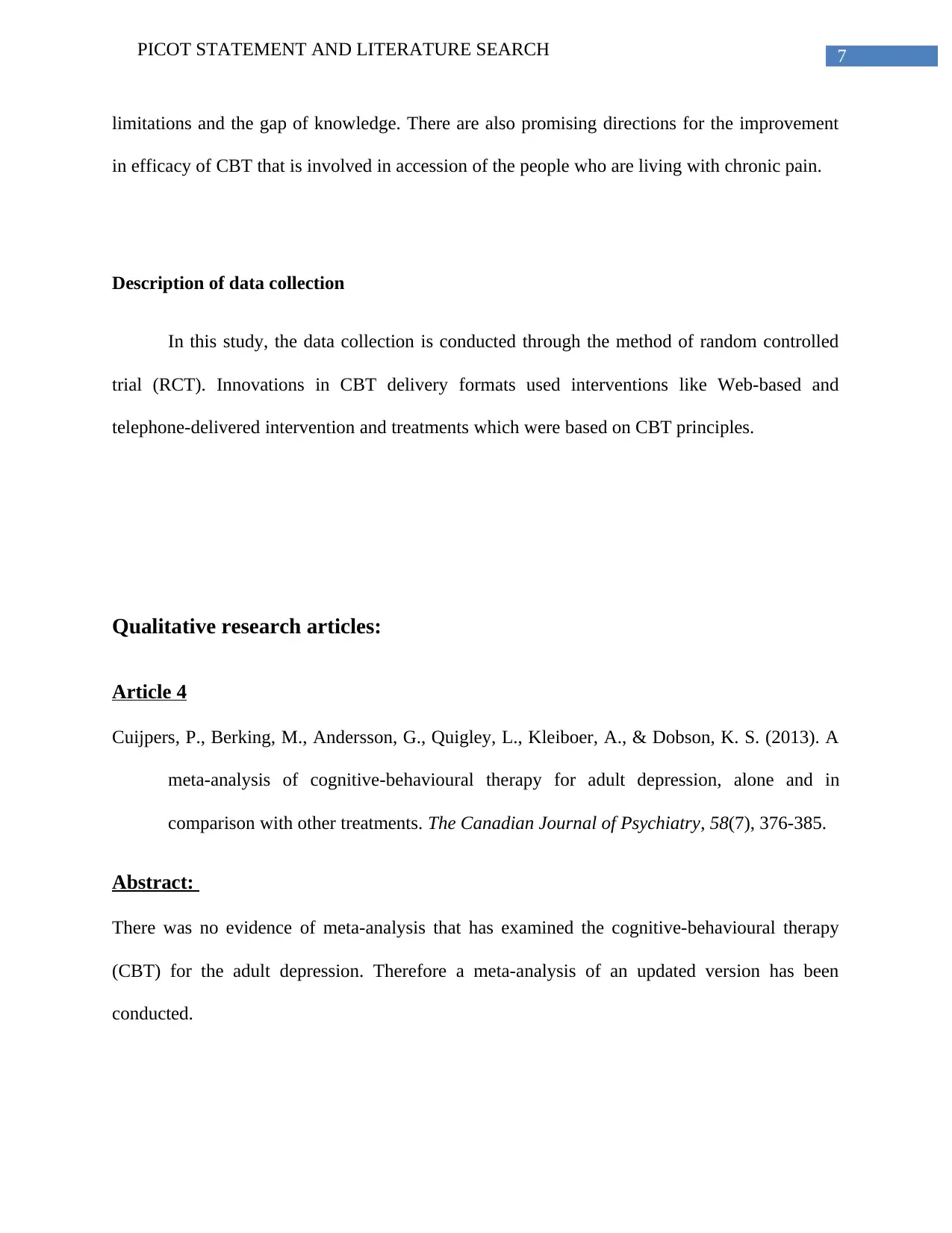
7PICOT STATEMENT AND LITERATURE SEARCH
limitations and the gap of knowledge. There are also promising directions for the improvement
in efficacy of CBT that is involved in accession of the people who are living with chronic pain.
Description of data collection
In this study, the data collection is conducted through the method of random controlled
trial (RCT). Innovations in CBT delivery formats used interventions like Web-based and
telephone-delivered intervention and treatments which were based on CBT principles.
Qualitative research articles:
Article 4
Cuijpers, P., Berking, M., Andersson, G., Quigley, L., Kleiboer, A., & Dobson, K. S. (2013). A
meta-analysis of cognitive-behavioural therapy for adult depression, alone and in
comparison with other treatments. The Canadian Journal of Psychiatry, 58(7), 376-385.
Abstract:
There was no evidence of meta-analysis that has examined the cognitive-behavioural therapy
(CBT) for the adult depression. Therefore a meta-analysis of an updated version has been
conducted.
limitations and the gap of knowledge. There are also promising directions for the improvement
in efficacy of CBT that is involved in accession of the people who are living with chronic pain.
Description of data collection
In this study, the data collection is conducted through the method of random controlled
trial (RCT). Innovations in CBT delivery formats used interventions like Web-based and
telephone-delivered intervention and treatments which were based on CBT principles.
Qualitative research articles:
Article 4
Cuijpers, P., Berking, M., Andersson, G., Quigley, L., Kleiboer, A., & Dobson, K. S. (2013). A
meta-analysis of cognitive-behavioural therapy for adult depression, alone and in
comparison with other treatments. The Canadian Journal of Psychiatry, 58(7), 376-385.
Abstract:
There was no evidence of meta-analysis that has examined the cognitive-behavioural therapy
(CBT) for the adult depression. Therefore a meta-analysis of an updated version has been
conducted.
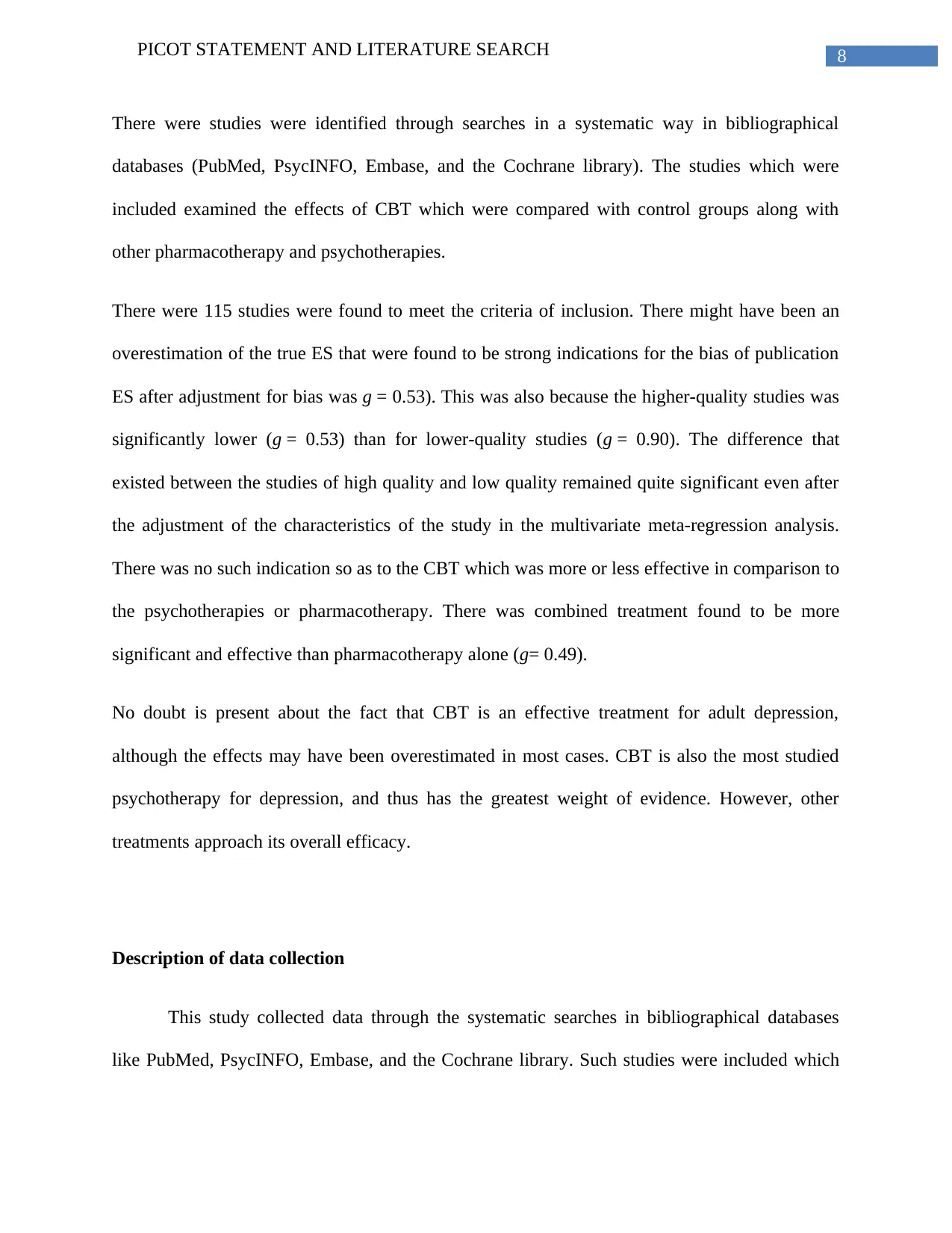
8PICOT STATEMENT AND LITERATURE SEARCH
There were studies were identified through searches in a systematic way in bibliographical
databases (PubMed, PsycINFO, Embase, and the Cochrane library). The studies which were
included examined the effects of CBT which were compared with control groups along with
other pharmacotherapy and psychotherapies.
There were 115 studies were found to meet the criteria of inclusion. There might have been an
overestimation of the true ES that were found to be strong indications for the bias of publication
ES after adjustment for bias was g = 0.53). This was also because the higher-quality studies was
significantly lower (g = 0.53) than for lower-quality studies (g = 0.90). The difference that
existed between the studies of high quality and low quality remained quite significant even after
the adjustment of the characteristics of the study in the multivariate meta-regression analysis.
There was no such indication so as to the CBT which was more or less effective in comparison to
the psychotherapies or pharmacotherapy. There was combined treatment found to be more
significant and effective than pharmacotherapy alone (g= 0.49).
No doubt is present about the fact that CBT is an effective treatment for adult depression,
although the effects may have been overestimated in most cases. CBT is also the most studied
psychotherapy for depression, and thus has the greatest weight of evidence. However, other
treatments approach its overall efficacy.
Description of data collection
This study collected data through the systematic searches in bibliographical databases
like PubMed, PsycINFO, Embase, and the Cochrane library. Such studies were included which
There were studies were identified through searches in a systematic way in bibliographical
databases (PubMed, PsycINFO, Embase, and the Cochrane library). The studies which were
included examined the effects of CBT which were compared with control groups along with
other pharmacotherapy and psychotherapies.
There were 115 studies were found to meet the criteria of inclusion. There might have been an
overestimation of the true ES that were found to be strong indications for the bias of publication
ES after adjustment for bias was g = 0.53). This was also because the higher-quality studies was
significantly lower (g = 0.53) than for lower-quality studies (g = 0.90). The difference that
existed between the studies of high quality and low quality remained quite significant even after
the adjustment of the characteristics of the study in the multivariate meta-regression analysis.
There was no such indication so as to the CBT which was more or less effective in comparison to
the psychotherapies or pharmacotherapy. There was combined treatment found to be more
significant and effective than pharmacotherapy alone (g= 0.49).
No doubt is present about the fact that CBT is an effective treatment for adult depression,
although the effects may have been overestimated in most cases. CBT is also the most studied
psychotherapy for depression, and thus has the greatest weight of evidence. However, other
treatments approach its overall efficacy.
Description of data collection
This study collected data through the systematic searches in bibliographical databases
like PubMed, PsycINFO, Embase, and the Cochrane library. Such studies were included which
⊘ This is a preview!⊘
Do you want full access?
Subscribe today to unlock all pages.

Trusted by 1+ million students worldwide
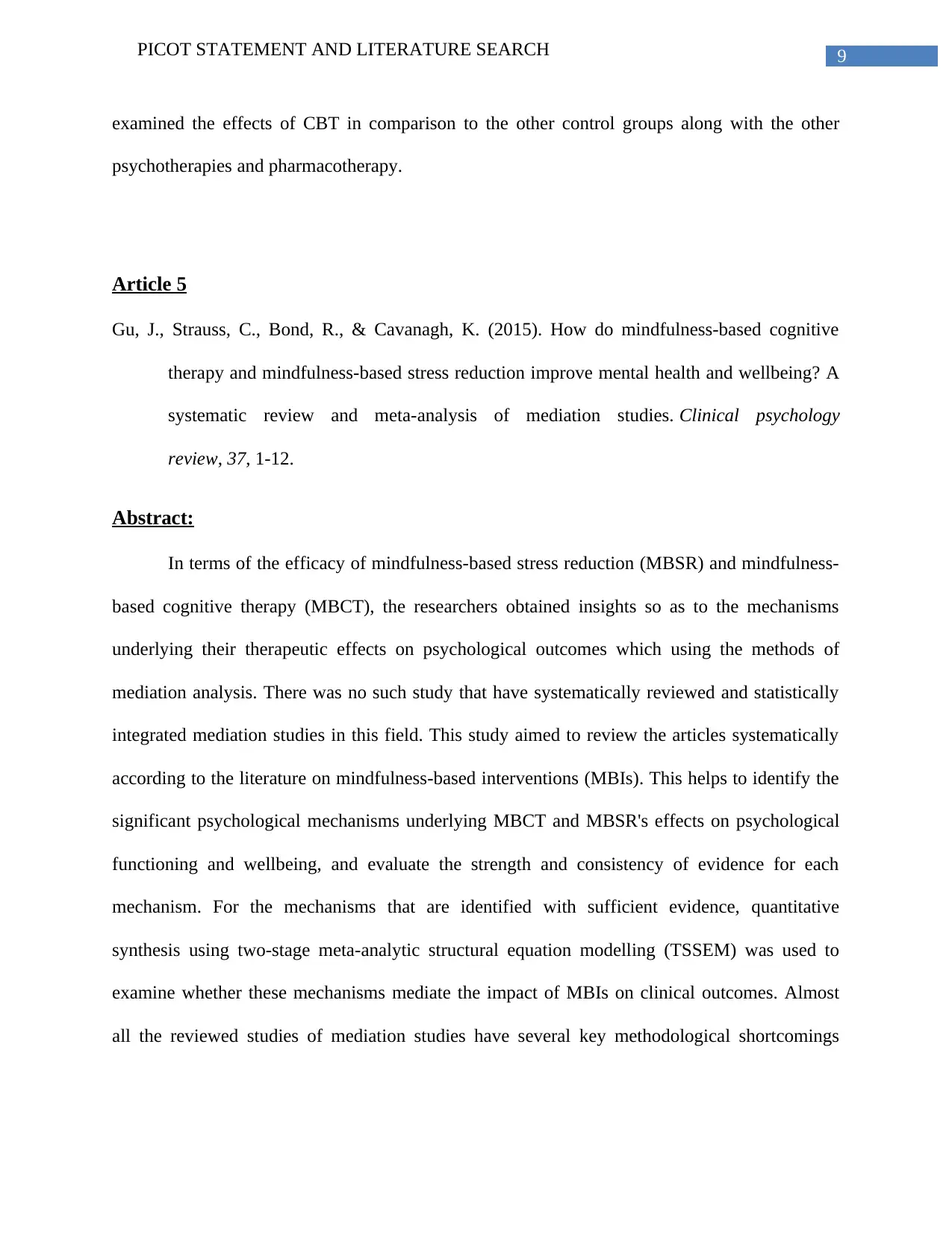
9PICOT STATEMENT AND LITERATURE SEARCH
examined the effects of CBT in comparison to the other control groups along with the other
psychotherapies and pharmacotherapy.
Article 5
Gu, J., Strauss, C., Bond, R., & Cavanagh, K. (2015). How do mindfulness-based cognitive
therapy and mindfulness-based stress reduction improve mental health and wellbeing? A
systematic review and meta-analysis of mediation studies. Clinical psychology
review, 37, 1-12.
Abstract:
In terms of the efficacy of mindfulness-based stress reduction (MBSR) and mindfulness-
based cognitive therapy (MBCT), the researchers obtained insights so as to the mechanisms
underlying their therapeutic effects on psychological outcomes which using the methods of
mediation analysis. There was no such study that have systematically reviewed and statistically
integrated mediation studies in this field. This study aimed to review the articles systematically
according to the literature on mindfulness-based interventions (MBIs). This helps to identify the
significant psychological mechanisms underlying MBCT and MBSR's effects on psychological
functioning and wellbeing, and evaluate the strength and consistency of evidence for each
mechanism. For the mechanisms that are identified with sufficient evidence, quantitative
synthesis using two-stage meta-analytic structural equation modelling (TSSEM) was used to
examine whether these mechanisms mediate the impact of MBIs on clinical outcomes. Almost
all the reviewed studies of mediation studies have several key methodological shortcomings
examined the effects of CBT in comparison to the other control groups along with the other
psychotherapies and pharmacotherapy.
Article 5
Gu, J., Strauss, C., Bond, R., & Cavanagh, K. (2015). How do mindfulness-based cognitive
therapy and mindfulness-based stress reduction improve mental health and wellbeing? A
systematic review and meta-analysis of mediation studies. Clinical psychology
review, 37, 1-12.
Abstract:
In terms of the efficacy of mindfulness-based stress reduction (MBSR) and mindfulness-
based cognitive therapy (MBCT), the researchers obtained insights so as to the mechanisms
underlying their therapeutic effects on psychological outcomes which using the methods of
mediation analysis. There was no such study that have systematically reviewed and statistically
integrated mediation studies in this field. This study aimed to review the articles systematically
according to the literature on mindfulness-based interventions (MBIs). This helps to identify the
significant psychological mechanisms underlying MBCT and MBSR's effects on psychological
functioning and wellbeing, and evaluate the strength and consistency of evidence for each
mechanism. For the mechanisms that are identified with sufficient evidence, quantitative
synthesis using two-stage meta-analytic structural equation modelling (TSSEM) was used to
examine whether these mechanisms mediate the impact of MBIs on clinical outcomes. Almost
all the reviewed studies of mediation studies have several key methodological shortcomings
Paraphrase This Document
Need a fresh take? Get an instant paraphrase of this document with our AI Paraphraser
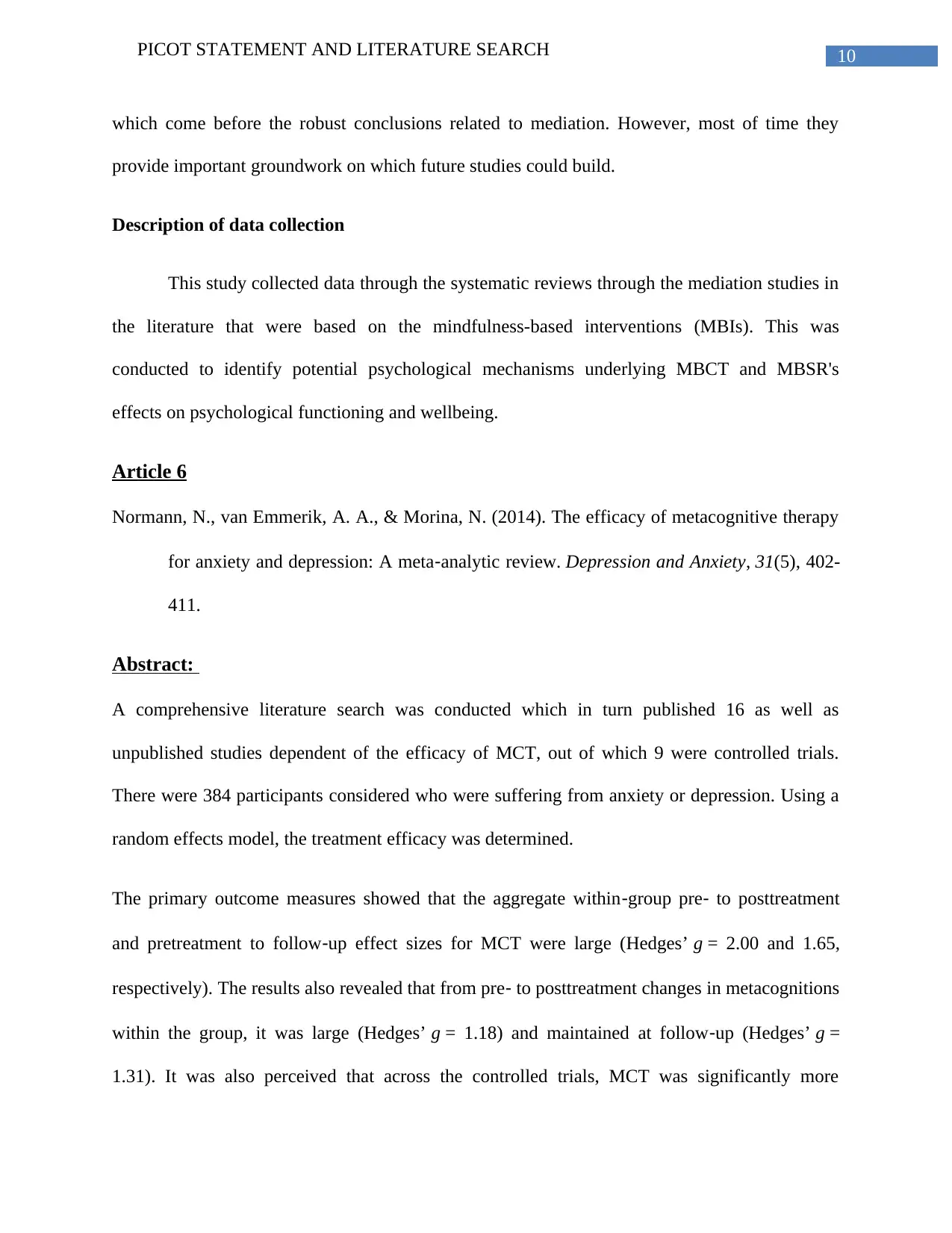
10PICOT STATEMENT AND LITERATURE SEARCH
which come before the robust conclusions related to mediation. However, most of time they
provide important groundwork on which future studies could build.
Description of data collection
This study collected data through the systematic reviews through the mediation studies in
the literature that were based on the mindfulness-based interventions (MBIs). This was
conducted to identify potential psychological mechanisms underlying MBCT and MBSR's
effects on psychological functioning and wellbeing.
Article 6
Normann, N., van Emmerik, A. A., & Morina, N. (2014). The efficacy of metacognitive therapy
for anxiety and depression: A meta‐analytic review. Depression and Anxiety, 31(5), 402-
411.
Abstract:
A comprehensive literature search was conducted which in turn published 16 as well as
unpublished studies dependent of the efficacy of MCT, out of which 9 were controlled trials.
There were 384 participants considered who were suffering from anxiety or depression. Using a
random effects model, the treatment efficacy was determined.
The primary outcome measures showed that the aggregate within‐group pre‐ to posttreatment
and pretreatment to follow‐up effect sizes for MCT were large (Hedges’ g = 2.00 and 1.65,
respectively). The results also revealed that from pre‐ to posttreatment changes in metacognitions
within the group, it was large (Hedges’ g = 1.18) and maintained at follow‐up (Hedges’ g =
1.31). It was also perceived that across the controlled trials, MCT was significantly more
which come before the robust conclusions related to mediation. However, most of time they
provide important groundwork on which future studies could build.
Description of data collection
This study collected data through the systematic reviews through the mediation studies in
the literature that were based on the mindfulness-based interventions (MBIs). This was
conducted to identify potential psychological mechanisms underlying MBCT and MBSR's
effects on psychological functioning and wellbeing.
Article 6
Normann, N., van Emmerik, A. A., & Morina, N. (2014). The efficacy of metacognitive therapy
for anxiety and depression: A meta‐analytic review. Depression and Anxiety, 31(5), 402-
411.
Abstract:
A comprehensive literature search was conducted which in turn published 16 as well as
unpublished studies dependent of the efficacy of MCT, out of which 9 were controlled trials.
There were 384 participants considered who were suffering from anxiety or depression. Using a
random effects model, the treatment efficacy was determined.
The primary outcome measures showed that the aggregate within‐group pre‐ to posttreatment
and pretreatment to follow‐up effect sizes for MCT were large (Hedges’ g = 2.00 and 1.65,
respectively). The results also revealed that from pre‐ to posttreatment changes in metacognitions
within the group, it was large (Hedges’ g = 1.18) and maintained at follow‐up (Hedges’ g =
1.31). It was also perceived that across the controlled trials, MCT was significantly more

11PICOT STATEMENT AND LITERATURE SEARCH
effective than both waitlist control groups (between‐group Hedges’ g = 1.81) as well as cognitive
behavior therapy (CBT; between‐group Hedges’ g = 0.97).
From the study it was seen that that MCT is effective in treating disorders of anxiety and
depression and is superior compared to waitlist control groups and CBT, however it was found
that there was requirement in caution for the latter findings. The limitations were posed on the
implications of these findings by the small sample sizes and few active control conditions. There
was requirement for future studies should include larger sample sizes and also include
comparisons of MCT with other empirically supported therapies.
Description of data collection
In order to collect data, a comprehensive literature was conducted in order to search
published as well as unpublished studies on the efficacy of MCT.
effective than both waitlist control groups (between‐group Hedges’ g = 1.81) as well as cognitive
behavior therapy (CBT; between‐group Hedges’ g = 0.97).
From the study it was seen that that MCT is effective in treating disorders of anxiety and
depression and is superior compared to waitlist control groups and CBT, however it was found
that there was requirement in caution for the latter findings. The limitations were posed on the
implications of these findings by the small sample sizes and few active control conditions. There
was requirement for future studies should include larger sample sizes and also include
comparisons of MCT with other empirically supported therapies.
Description of data collection
In order to collect data, a comprehensive literature was conducted in order to search
published as well as unpublished studies on the efficacy of MCT.
⊘ This is a preview!⊘
Do you want full access?
Subscribe today to unlock all pages.

Trusted by 1+ million students worldwide
1 out of 14
Related Documents
Your All-in-One AI-Powered Toolkit for Academic Success.
+13062052269
info@desklib.com
Available 24*7 on WhatsApp / Email
![[object Object]](/_next/static/media/star-bottom.7253800d.svg)
Unlock your academic potential
Copyright © 2020–2026 A2Z Services. All Rights Reserved. Developed and managed by ZUCOL.





